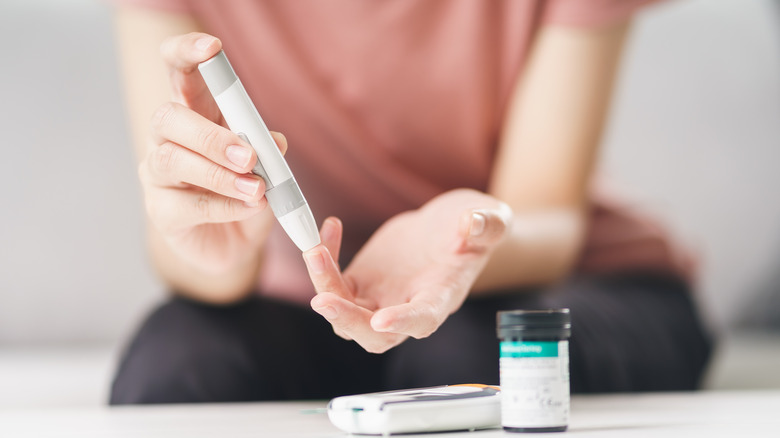Can Hypoglycemia Affect Fertility?
To carry out pregnancy as safely as possible, we know that the body should ideally be in optimal health. Having a health condition, such as high or low blood sugar, can make pregnancy much more difficult for a new mother.
A 2022 article published in StatPearls explains how blood sugar, more formally known as "glucose," travels through the bloodstream and provides energy to the entire body. A glucose screening test is routinely administered to pregnant women who have a risk of diabetes to monitor their blood sugar levels, according to Mount Sinai. An hour after consuming a glucose solution, an expecting mother's blood sugar should be equal to or less than 140 milligrams per deciliter (mg/dL). Elevated blood sugar levels could indicate gestational diabetes, and blood sugar levels that are too low are referred to as "hypoglycemia."
An individual with hypoglycemia will have a fasting blood sugar level of 70 mg/dL or less, reports the Mayo Clinic. In some cases, hypoglycemia can occur as a reaction to insulin and medications used to treat abnormally high blood sugar levels in individuals with diabetes. Some symptoms of hypoglycemia include sweating, tremors, headaches, nausea, and dizziness. Hypoglycemia should be treated as soon as possible, as it can lead to loss of consciousness and seizures in severe cases.
Hypoglycemia can be dangerous for anyone, but what are its effects on a pregnant woman and her developing baby? Additionally, does having low blood sugar interfere with someone's ability to get pregnant?
How hypoglycemia impacts fertility
The American Diabetes Association reports that unusually high blood sugar levels can increase the risk of conceiving a baby with a heart, kidney, brain, or spinal cord birth defect. Are low blood sugar levels also associated with such detrimental effects for a developing fetus?
According to the Centers for Disease Control and Prevention (CDC), many people who have low blood sugar also have type 1 diabetes. The CDC reports that pregnant women who have unmanaged diabetes have an increased risk of having a miscarriage or stillbirth. There are other reproductive factors that contribute to fertility issues in women with diabetes, like irregular periods, polycystic ovary syndrome (PCOS), and premature menopause, according to UNC Fertility. Diabetes doesn't only affect fertility in women, as some men with diabetes experience erectile dysfunction, an inability to ejaculate, decreased sperm count, and abnormal sperm shape.
Consistent low blood sugar levels during pregnancy may be associated with stunted growth of the fetus and babies born smaller than the typical size for their gestational age, per a 2020 article published in Frontiers in Diabetes. Hypoglycemia in a mother may also contribute to damage to the fetal beta cells that produce insulin. The role of hypoglycemia as a teratogen for a fetus is still up for debate, and further research needs to be conducted to gain more clarity.
An expecting mother who lives with diabetes or experiences low blood sugar levels can, however, learn how to manage her condition and have a healthy pregnancy.
How to manage hypoglycemia
The first step to managing your blood sugar levels during your pregnancy is to be able to recognize when they are low. However, hypoglycemia may not always be easy to detect because some people don't show symptoms or their bodies stop showing symptoms after a period of time. This can happen if the body has become accustomed to having low blood sugar, explains the Cleveland Clinic. Asking for additional help from loved ones and receiving regular blood sugar checkups can help someone keep track of when they are experiencing hypoglycemia. Continuous glucose monitoring (CGM) devices are also able to notify someone when their blood sugar is low.
The American Diabetes Association describes the "15-15 rule" used to treat individuals with hypoglycemia, which entails consuming 15 grams of carbohydrates to increase blood sugar levels. Some examples of carbohydrates that someone can try are sugar tablets, juice, regular soda, hard candies, honey, and corn syrup. After 15 minutes, blood sugar levels should be checked again to see if they have reached 70 mg/dL or more. This process is repeated until blood sugar levels are back to normal. To maintain a healthy blood sugar level, it's recommended to eat a snack afterward. It's important to avoid eating too much at once, as this can cause your blood sugar levels to spike.
Someone with hypoglycemia may also choose to seek out additional resources, such as nutrition counseling with a registered dietitian, notes the Mayo Clinic.



